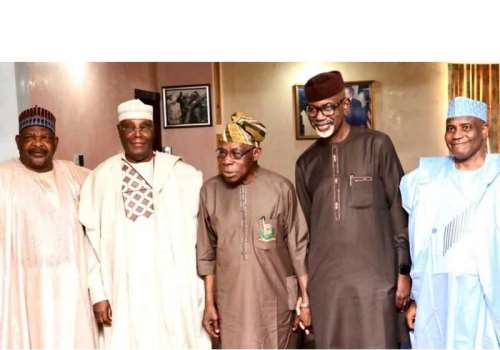Mystery and intrigue surrounded the halls of the Olusegun Obasanjo Presidential Library in Abeokuta on Monday as former Vice President Atiku Abubakar made an unexpected visit to his former boss, despite emphatic denials of any political motives behind the meeting.
Arriving at precisely 12:37 p.m., Abubakar’s presence at the prestigious facility immediately drew attention, particularly given his high-profile entourage. The delegation included political heavyweights such as former Governors Senator Liyel Imoke of Cross Rivers State and Senator Aminu Tambuwal of Sokoto State, alongside Senator Abdul Ningi and other notable figures.
The distinguished visitors were warmly received by elder statesman Otunba Oyewole Fasawe at Obasanjo’s residence, before proceeding to what would become a lengthy private discussion lasting approximately ninety minutes. The closed-door meeting, which concluded at 2:17 p.m., has become the subject of intense speculation within Nigeria’s political circles.
Following the extensive discussion, Abubakar faced waiting journalists, steadfastly maintaining that his visit was purely a courtesy call to his former principal. When pressed about potential connections to presidential ambitions for 2027, the former Vice President repeatedly emphasized the personal nature of the visit, stating firmly, “I am here on courtesy call. I am not here to talk politics.”
The timing and composition of the visiting delegation have nonetheless raised eyebrows among political observers. The presence of influential former governors and current senators suggests a gathering of significant political weight, despite assertions to the contrary. The meeting’s duration also hints at substantial discussions beyond mere pleasantries.
This visit holds particular significance given the historical relationship between Obasanjo and Abubakar, who served together at the helm of Nigeria’s democratic renaissance from 1999 to 2007. Their political partnership, though occasionally marked by tensions, played a crucial role in shaping Nigeria’s return to democratic governance.
Political analysts note that such high-level meetings, especially involving figures of Obasanjo and Abubakar’s stature, rarely occur without broader implications for Nigeria’s political landscape. The former president’s influence as a key elder statesman and his track record of political kingmaking add weight to any such encounter, regardless of its stated purpose.
The location of the meeting at the Olusegun Obasanjo Presidential Library, a symbol of Nigeria’s democratic journey and political heritage, adds another layer of significance to the occasion. The facility, which houses important historical documents and serves as a center for political discourse, provides an appropriate backdrop for discussions about Nigeria’s past, present, and future.
Despite Abubakar’s insistence on the non-political nature of the visit, the Nigerian political sphere continues to buzz with speculation about potential alignments and strategies for the upcoming electoral cycle. The meeting occurs against the backdrop of ongoing national discussions about leadership succession and political stability.
The gathering also highlights the enduring importance of personal relationships and informal networks in Nigerian politics, where courtesy visits and private meetings often serve as precursors to more significant political developments. The presence of multiple political figures from different regions of the country suggests a possible attempt at building or maintaining crucial political bridges.
As Nigeria continues its democratic journey, such meetings between key political figures remain crucial moments for observation and analysis. While the true nature and outcomes of the discussion may remain private, the visit itself serves as a reminder of the complex web of relationships and interactions that characterize Nigerian political life.
Whether purely social or quietly strategic, this meeting between two of Nigeria’s most prominent political figures adds another intriguing chapter to the ongoing narrative of national leadership and political dynamics, even as both participants maintain its informal nature.




